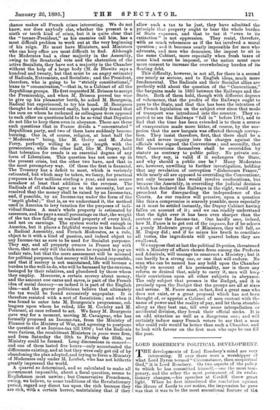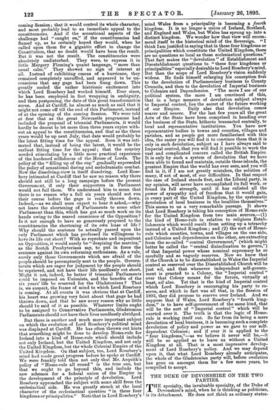LORD ROSEBERY'S POLITICAL DEVELOPMENT. T HE developments of Lord Rosebery's mind
are very interesting. If ever there were a worshipper of what Lord Byron termed" Circumstance, thou unspiritual God," it is Lord Rosebery. On two aspects of the policy to which he has committed himself,—one the most tem- porary, and the other the most permanent of its evolu- tionary changes,—his speeches at Cardiff threw great light. When he first introduced the resolution against the House of Lords to our notice, the impression he gave was that it was to be the most sensational feature of the coming Session ; that it would control its whole character, and most probably lead to an immediate appeal to the constituencies. And if the sensational aspects of the challenge had " caught on," if the constituencies had flamed up, as he certainly hoped they would, when he called upon them for a gigantic effort to change the Constitution, that no doubt would have been the result. But it was not the result. The constituencies were absolutely undisturbed. They were, to express it in little Margery Fleming's quaint language, " more than usual calm." They showed no sign of interest at all. Instead of exhibiting omens of a hurricane, they remained completely unruffled, and appeared to be un- conscious that any gage had been flung down. This greatly cooled the rather histrionic excitement into which Lord Rosebery had worked himself. Ever since, he has been employed in first wrapping in ambiguity, and then postponing, the date of this great transformation scene. And at Cardiff, he almost as much as said that it might not come off till the end of this Parliament, instead of at the opening of the coming Session. We were told at first that as the great Newcastle programme had included the proposal of triennial Parliaments, it would hardly be decent to let more than three years expire with- out an appeal to the constituencies, and that as the three years would be up next July, that date would probably be the latest fitting time for the appeal. Soon it was inti- mated that, instead of being the latest, it would be the earliest fitting time for the appeal ; that the country needed stimulating by a little more practical experience of the hardened selfishness of the House of Lords. The policy of the " filling up of the cup " gradually superseded the policy of sensational daring and melodramatic combat. Now the dissolving-view is itself dissolving. Lord Rose- bery intimated at Cardiff that he saw no reason why there should not still be a long campaign before the present Government, if only their supporters in Parliament would not fail them. We understand him to mean that there is no reason why a full six years should not run their course before the gage is really thrown down. Indeed,—as we shall soon expect to hear it asked,—why not leave the shortening of Parliaments to some other Parliament than this, which has got so much work on its hands owing to the seared conscience of the Opposition ? Is it not enough to have so generously proposed to the constituencies the shortening of its own lease of life ? Why should the sentence be actually passed upon the only Parliament which has professed its willingness to have its life cut short ? With so reprobate and impenitent an Opposition, it would surely be " despising the marcies," as the Scotch Presbyterians say, to put in force the sentence against its own reforming enthusiasm. As a rule, surely only those Governments which are afraid of the people should be peremptorily sent to the people. Govern- ments which are eager for judgment by the people should be reprieved, and not have their life needlessly cut short. Might it not, indeed, be better if triennial Parliaments could be imposed on Unionists, and the benefits of the six years' life be reserved for the Gladstonians ? That is, we suspect, the frame of mind to which Lord Rosebery is coming. At all events it was obvious that at Cardiff, his .heart was growing very faint about that gage he had thrown down, and that he saw every reason why as little should le said of it as possible. Whatever limits ought to be assigned to Conservative Parliaments, Gladstonian Parliaments should not have their lives needlessly abridged.
But there is another and much more important subject on which the evolution of Lord Rosebery's political mind was displayed at Cardiff. He has often thrown out hints that something might be done to develop Home-rule for Ireland into a kind of Home-rule which should include not only Ireland, but the United Kingdom, and not only the United Kingdom, but the whole Colonial Empire of the United Rirgdom. On that subject, too, Lord Rosebery's mind had made great progress before he spoke at Cardiff. We were frankly told then not only that Mr. Asquith's policy of " Home-rule all round" is the true one, but that we ought to go beyond this, and include the new schemes for a federal union of the Empire in the development of the principle of devolution. Lord Rosebery approached the subject with some skill from the ecclesiastical side. He was greatly struck at the local character of the ecclesiastical question " in these four kingdoms or principalities." Note that in Lord Rosebery's mind Wales from a principality is becoming a fourth kingdom. It is no longer a union of Ireland, Scotland, and England and Wales, but Wales has sprung up into a distinct kingdom. We wonder how that view will recom- mend itself to the historical mind of the Sovereign. " I think lam justified in saying that in these four kingdoms or principalities which constitute the United Kingdom, there are no questions so local as these ecclesiastical questions." That fact makes the " devolution " of Establishment and Disestablishment questions to " these four kingdoms or principalities" especially desirable to Lord Rosebery's mind. But then the scope of Lord Rosebery's vision suddenly widens. He finds himself enlarging his conception first to the devolution of Parliamentary business to County Councils, and then to the devolution of Imperial business to Colonies and Dependencies. " The more I see of our political system, the more I am convinced of this, that in a large measure of devolution subject always to Imperial control, lies the secret of the future working of our Empire. Daily also that devolution comes nearer and nearer. For the last few years all the great Acts of the State have been comprised in handing over the business of the State, hitherto transacted centrally, to local and representative institutions. You have now representative bodies in towns and counties, villages and parishes, and as people get more familiarised with this idea, the easier you will find it to convince them that it is only in such devolution, subject as I have always said to Imperial control, that you will find it possible to work the vast and complicated concern called the British Empire. It is only by such a system of devolution that we have been able to found and maintain, outside these islands, the greatest Empire that the world has ever seen, and you will find in it, if I am not greatly mistaken, the solution of many, if not of most, of our difficulties. In that respect the case of Ireland stands first, and the Liberal party, in my opinion, will never have accomplished its full work, or found its full strength, until it has enlisted all the power of sympathy and of freedom that it would gain, in every part of the United Kingdom, by the systematic devolution of local business in the localities themselves." This seems to us a very remarkable passage. It shows that Lord Rosebery is taking his conception of Home-rule for the United Kingdom from two main sources,—(1) the kind of Home-rule in relation to religious Estab- lishments which would result from setting up a tetrarchy instead of a United Kingdom ; and (2) the sort of Home- rule which counties, towns, and villages on the one side, and Colonies and dependencies on the other, are extracting from the so-called " central Government," (which might better be called the " central disinclination to govern,") of that Imperial power whose nominal supremacy he so carefully and so vaguely reserves. Now we know that if the Church is to be disestablished in Wales the Imperial control so reserved over the Disestablished Church will be just nil, and that whenever independent self-govern- ment is granted to a Colony, the "Imperial control " over that Colony means for the future, virtually at least, nil also. Yet that is the kind of Imperial control which Lord Rosebery is encouraging his party to re- serve, and which in fact was all that, in the Session of 1893, they did propose to reserve over Ireland. And we suppose that if Wales, Lord Rosebery's " fourth king- dom," is to have self-government of the same kind, that will be the sort of "Imperial control" which will be exerted over it. The truth is that the logic of Home- rule is working itself out. So far from its being a mere devolution of local business, it is becoming such a complete devolution of policy and power as we gave to our self- dependent Colonies ; and if ever it is applied to the " four kingdoms,"—as we believe it never will be,—it will be so applied as to leave us without a United Kingdom at all. That is a most impressive develop- ment of Lord Rosebery's policy. And we may depend upon it, that what Lord Rosebery already anticipates, the whole of the Gladstonian party will, before evolution has gone on amongst them for a few more years, be compelled to accept.



















































 Previous page
Previous page